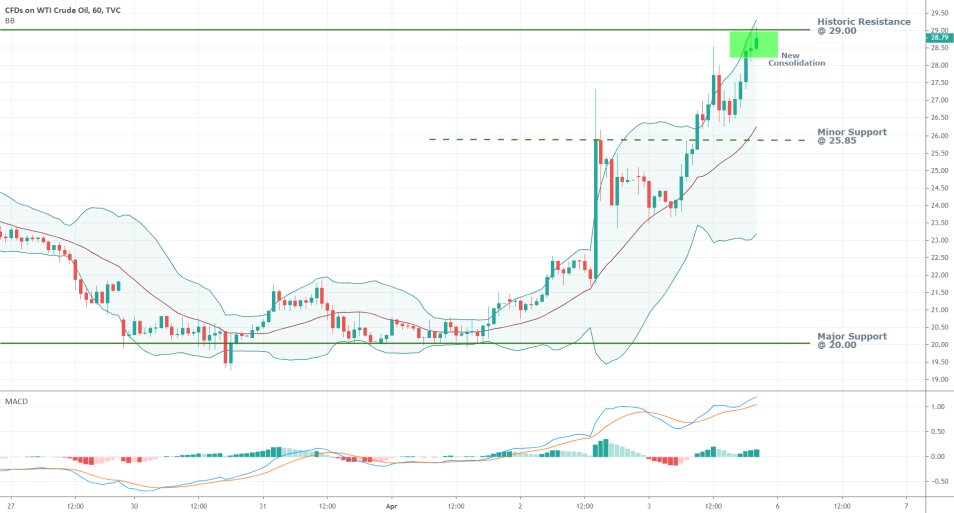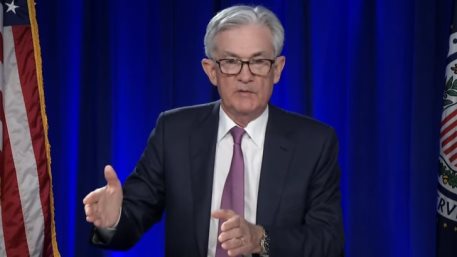
Investors finished last week’s trading session on a high note, expecting a quick resolution to the ongoing oil price war, which devastated the energy market already reeling from the coronavirus pandemic.
It was hoped that an OPEC+ videoconference would be held on Monday, allowing Riyadh and Moscow to reach a mutually satisfying agreement that would calm the jolted energy market.
The world’s two biggest oil exporters have reached a deadlock in negotiating the appropriate cuts in production, and the situation has continued to escalate as Saudi Arabia and Russia bolstered their production capacities.
As a result of that, the market is currently oversupplied with cheap oil, at a time when global demand is subdued due to the ongoing pandemic.
General market optimism was reinstated on Thursday when Donald Trump unexpectedly claimed that he has helped the Crown Prince of Saudi Arabia Mohammad bin Salman and the Russian President Vladimir Putin agree to renew strategic discussions of output reductions.
Just spoke to my friend MBS (Crown Prince) of Saudi Arabia, who spoke with President Putin of Russia, & I expect & hope that they will be cutting back approximately 10 Million Barrels, and maybe substantially more which, if it happens, will be GREAT for the oil & gas industry!
— Donald J. Trump (@realDonaldTrump) April 2, 2020
Trump’s tweet came after he had recently pledged to intervene in the situation and act as a mediator between the two sides. He made the announcement shortly after the release of the gloomiest NFP report (read about it below) in decades, which cushioned the negative impact on the market from the massive surge in unemployment.
Investors' hopes for a quick solution; however, could be promptly dismissed as a new rift between the two opposing sides seems to be endangering the anticipated talks. According to Bloomberg, the on and off shifting of blame between Moscow and Riyadh threatens to jeopardise Trump’s attempts to broker a deal.
“In a statement early on Saturday, the Saudi Foreign Minister Prince Faisal bin Farhan said comments by Putin laying blame on Riyadh for the end of the OPEC+ pact between the two countries in March were “fully devoid of truth. […] “Russia was the one that refused the agreement” in early March, the Saudi foreign ministry said. “The kingdom and 22 other countries were trying to persuade Russia to make further cuts and extend the agreement.”
If the general diplomatic tone continues to deteriorate and the trade talks are postponed or cancelled altogether, a new selloff could follow the 33 per cent crude oil rally from the end of last week.
The price of crude oil is currently consolidating just below the historic support (presently resistance) level at 29.00.

Trendsharks Premium
Gold is undergoing a correction, as investors take profits to offset losses from falling stock prices, impacting their margins. However, we anticipate a renewed wave of [...]
The Swiss stock market index is mirroring its global counterparts, such as Germany 40 and US100, experiencing a sharp decline following the announcement of new [...]
We’re analyzing the weekly chart to grasp the broader market trend. Over the past three years, the US30 index has surged by 17,000 points, often resembling a nearly straight [...]
Over the past week, the DAX has experienced a sharp decline, plunging by an astonishing 3,400 points. This downward movement is not isolated, as its international counterparts, such as the UK100 and US100, are also facing significant [...]
EURUSD recently formed a double top at 1.0930, signaling a potential trend reversal, and has since begun a correction. After a 600-pip rally since early March, a pullback at this stage is both expected and healthy. Given these conditions, we are placing a [...]
Since early March, EURJPY has surged nearly 1,000 pips, providing us with several excellent trading opportunities. However, as the rally matures, many early buyers are beginning to take profits, leading to a noticeable slowdown in the uptrend. On Friday, the pair formed a [...]
The AUDJPY currency pair continues to be dominated by bullish momentum, as multiple golden cross patterns reaffirm the strength of the ongoing uptrend. Despite this, we are witnessing a much-needed [...]
The EURAUD currency pair appears to be undergoing a trend reversal, signaling a potential shift in market direction. A notable technical development is the formation of a Death Cross on the chart, a widely recognized bearish indicator that typically suggests a [...]
After securing an impressive 200-pip profit last week, the EURJPY currency pair is now undergoing a southward correction, retracing some of its recent gains. Despite this temporary pullback, the Golden Cross remains intact, reinforcing our view that the overall trend continues to be [...]
The appearance of a Golden Cross in Silver strengthens our analysis that the metal is currently in a strong uptrend, indicating further bullish momentum in the market. This technical pattern, where the short-term moving average crosses above the [...]
This trade presents a considerable level of risk and can be classified as an opportunistic move based on recent price action. The GBPUSD currency pair has experienced a substantial bullish rally, surging by nearly 500 pips in a strong upward movement. However, after this extended period of appreciation, the pair is showing signs of a potential [...]
The anticipated Death Cross on the SMI20 appears to be failing as price finds strong support at the 23% Fibonacci retracement level. After testing this area, the index has shown bullish strength, printing several large green candles, signaling an increase in [...]
A Golden Cross has just appeared on the USDJPY chart, signaling a potential bullish move. This technical pattern occurs when the 20 period moving average crosses above the 60 period moving average, a widely recognized indication of increasing [...]
After 2 months of a down trend, we finally see some indications of price recovery for Oil. The golden cross, a historic buy signal, supports this [...]
For the past month, the German DAX40 has experienced a remarkable 10% surge, reflecting strong bullish momentum. Despite ongoing market volatility and frequent pullbacks, every dip continues to attract fresh buyers, reinforcing the [...]
Oil continues its downward trajectory, despite occasional pullbacks. The overall trend remains bearish, reinforced by multiple Death Cross patterns, a classic sell signal indicating further weakness. Adding to this bearish outlook, the critical [...]
Over the past few days, gold has experienced a sharp decline of more than $100. This downturn can be attributed in part to traders securing profits to manage their margins, which are under strain due to the significant drop in major indices. Currently, gold has fallen below the [...]
The NASDAQ 100 index is showing strong bullish momentum, as evidenced by the formation of a Golden Cross on the chart. This classic buy signal occurs when the short moving average crosses above the long term moving average, suggesting that upward momentum is [...]
The EURAUD currency pair has encountered a significant resistance level, failing to break above the critical 61% Fibonacci retracement level. This suggests that bullish momentum is weakening, reinforcing the case for a potential downward move. Given this technical setup, we favor entering a [...]
The UK100 is experiencing a remarkable rally! Over the past few weeks, the British stock market index has surged nearly 800 points. Each minor dip has attracted more buyers, fueling the bullish momentum. However, since last week, we’ve observed a slight [...]




















